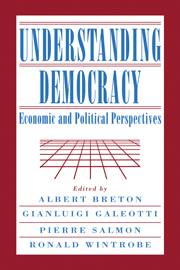12 - Democracy on the margin
Published online by Cambridge University Press: 05 December 2011
Summary
Democracy and group census
Because it faces severe limits on its workability, democracy is not a panacea for politics. It works only on the margins of great issues. The few big issues it can handle are those on which there is broad consensus–such as the consensuses in the United Kingdom, Canada, and the United States on fighting World War II. Most forms of government could handle such issues roughly as well. Indeed, the United Kingdom handled World War II by ceasing to be democratically accountable for the duration of the war. For conflictual issues, democracy can work only against a background of rough coordination on order. Without that essentially prior coordination, democracy is trammeled or irrelevant. And even with the relevant coordination on order, if precise theoretical claims are at issue, democracy works only in the sense that it reaches a result–but not in the sense that it gets the right result. Often, indeed, a democrat would want decisions to not be made democratically.
Democracy is essentially a member of the mutual-benefit class of theories. If political divisions cut very much deeper than the marginal issues on which we can democratically compromise, democracy may no longer seem to produce mutual benefits. It then produces major–not marginal–winners and losers. Big disagreements bring us down. For example, democracy could not handle conflict over slavery in the United States, it was very shaky in handling socialism in the postwar United Kingdom, and it could not even get off the ground in independent Burundi with its first democratic election pilloried as merely an ethnic census.
- Type
- Chapter
- Information
- Understanding DemocracyEconomic and Political Perspectives, pp. 249 - 266Publisher: Cambridge University PressPrint publication year: 1997
- 1
- Cited by



